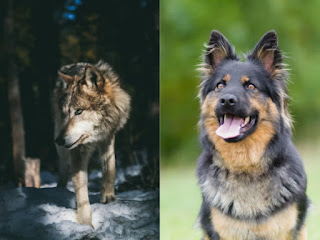Wolf-to-Dog Evolution Story Barking up the Wrong Tree
Edited 6 May 2022.
Biblical creationists and believers in universal common ancestor evolution agree for the most part that modern dogs descended from an animal like a wolf. Those dog breeds we see are the result of artificial selection, designed for certain traits. They are still dogs and have the chemistry to interbreed.
For that matter, coyotes are extremely wolf-like, and have no difficulty breeding with the dogs with which we are familiar. See "Coyotes Have Gone to the Dogs."
 |
| Unsplash / Andrew Ly (left) and Kanashi (right) |
One of the most widely accepted evolution stories—told by both creationists and evolutionists—is the domestication of wolves. It is commonly believed that wolves evolved into dogs. Dogs are thought to be less aggressive than wolves, judging from the family pets we all love. But how does a wild-type Canis familiaris mongrel behave in the wild?Creationists have long argued that wolf ‘evolution’ into modern dogs is due to selection of existing traits (i.e., microevolution), not ‘evolution’ from one Genesis kind to another kind (i.e., macroevolution). This process is no different, they say, than breeding. . . .The wolf domestication story embeds the belief that domestication made wolves less aggressive, and also significantly enhanced their socio-cognitive abilities. Evolutionists reject the Genesis account of variation within a kind, of course. They interpret the domestication of dogs as a case of macroevolution from a wolf to a new species of canine. Furthermore, instead of referring to dogs as domesticated wolves, evolutionists consider the many small microevolutionary changes as evidence of Darwinian evolution by accumulation of slight variations. In this case, they claim that the domesticated dog, Canis familiaris, descended from the gray wolf, Canis lupus and evolved over time into a new species with different traits and behaviors due to ‘selective pressure’ by humans.
You can read the entire article at "Did Nice Dogs Evolve from Mean Wolves?"
